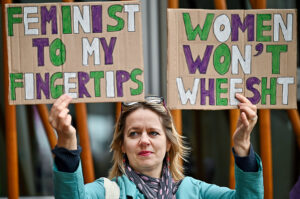How do you get a hypocrite to feel shame? The activist collective Led By Donkeys think they have found the answer: organise a needling visual provocation in the hypocrite’s vicinity, put the film of it online, then watch it go viral. You might wonder whether, despite the technological trappings, this isn’t just the modern equivalent of throwing rotten tomatoes, but Ben Stewart, James Sadri, Oliver Knowles and Will Rose want you to know they have been making important art all along. The quartet have a new coffee table book out to prove it, Adventures in Art, Activism and Accountability, documenting the group’s campaigns from the Brexit era to the present, and accompanied by a gallery exhibition in Bristol.
Their initial emergence was much lower key. An earlier book from 2019, capitalising on their newfound fame as self-described “Remainer activists”, describes the period in which they first became known for pasting posters on billboards in Southeast England, gonzo style. It is written up as a kind of subpar Ealing comedy: four ordinary house husbands from Hackney accidentally get caught up in a daring and wildly popular social protest, eventually becoming national heroes feted by Tony Blair, Steve Coogan, and Saatchi & Saatchi.
In this early telling of their origin story, there are comic capers galore, involving mishaps with wallpaper paste, run-ins with security guards, and the strategic recurrence of Ben’s fear of heights. There are also quite a few barely latent daddy issues (“What is it about David Davis that makes him such a prick?”;“there’s something about Dominic Raab that is volcanically dislikeable”; “Olly is possessed by a visceral dislike for Michael Gove”; “Firstly and lastly, fuck Rod Liddle”). And despite braggadocio at times implying that the four are hardened activists (“We’ve scaled buildings and occupied headquarters, hung banners and even been arrested and prosecuted”), equally there is much hammed up nervousness about committing illegal acts: “This is criminal damage; it’s the A10 … We don’t want to get arrested, we both have to take the kids to school and nursery in the morning”.
There is also enormous detail in the early book about how much things cost, giving rise to such fascinatingly banal sentences as: “We assume that ordering five 6x3m posters will set us back the best part of £1000 but in reality each poster is forty quid and delivery is free.” Gripping verbatim text exchanges from key moments in the project are included, such as “@Will, any chance of pdfs today? Or is kiddie craziness descending?” and “We should decide by tomorrow lunchtime so I can get the posters ordered to arrive his week”.
Things have got a lot slicker since the early days, and the virtual tomatoes are now heirloom variety (price available on request). In the new book, our guys are no longer styled as plucky outsiders but as solemnly engaged in an “accountability project”. In the interim, crowdfunder targets have been smashed; mutually advantageous corporate relationships have blossomed; famous screenwriters and actors are now onboard; and the groups’ campaigns, both here and in the US, have become bloated with technical gimmickry, celebrity collabs, and self-importance. And now that being a Remainer is no longer fashionable, the mission has seamlessly drifted into vaguer ideological territory: towards fighting what the new book variously calls “populist politics and petty nationalism” and “ethnojingoism”. Definitions are not supplied, but one suspects that however the authors mean “populist” and “petty”, it won’t turn out to include them.
In practice, their core business is still midwit vituperation by photoshop, mostly aimed at Right-wing politicians, plus some more positive interventions designed to tug at the heartstrings of the sort of person whose bicycle comes with a sidecar. So for instance: they enlisted a thousand volunteers to cover a wall of the Embankment with love hearts, thus creating “The National Covid Memorial Wall” ; covered the road outside the Russian Embassy with “non-toxic, chalk-based” blue and yellow paint; and projected “End Performative Cruelty” in giant letters onto the Bibby Stockholm barge, only months before releasing a remote-control banner in Liz Truss’s presence depicting her as a giant lettuce with eyes.
Also this year, they filmed six kilometres worth of second-hand kids’ outfits arranged on a Dorset beach and set it to the sound of Bach, in order to get people to “grasp … the number of children killed in Gaza”. (An earlier idea, thankfully rejected, involved “thousands of funeral shrouds”.) In other words: if you like your morality tales childishly uncomplicated, prefer the literal over the symbolic, and don’t mind pedestrian visuals that rely heavily on scale for impact, then this is undoubtedly the art collective you deserve.
I am sure that all this feels cathartic and noble for participants, but does any of it actually work? Could such clankingly heavy-handed treatments ever initiate a real moral reckoning for a corrupt politician or institution? It seems scarcely credible. In both of the Led By Donkeys books, virality alone is frequently taken as meaningful proof of impact, but this is unconvincing: feral squirrels in train carriages also go viral, after all.
At other points, the authors do their best to suggest they are making a difference, but only by blurring the lines between contiguity and causation, giving us sentences such as: “A week after this intervention, Abramovich was finally subjected to UK sanctions”; “A week later, the Met opened an investigation into 12 Downing Street parties”; “and “Two weeks later, Sunak called the election”. Coincidences? I think probably, yes; or else the real causal relation goes in the other direction, with the four cannily sensing which way the tide was already flowing before launching.
What does seem clear is that the group are absolutely terrible at changing political opponents’ minds, or even at persuading relatively intelligent neutrals. Confirmation bias is an exceptionally blunt instrument. In a recent Guardian interview, Ben Stewart talked approvingly about the “idea of the mind bomb”, as if he had stumbled upon a secret magic spell: the idea, apparently acquired during a stint at Greenpeace, of “an intervention that, when people saw it, their minds would immediately shift. The idea was the person putting themselves between the harpoon and the whale.”
What this leaves out is that, unlike real bombs, so-called mind bombs work best in wide open spaces; upon psyches where there is very limited relevant information to compete with whatever crassly emotive image is being used as explosive. In contrast, where a person already has a lot of complex and relevant factual information and/or clashing background principles and theories, a would-be mind bomb is more likely to be a damp squib, cementing the impression that the person lobbing it is a naïve buffoon.
In reality, I imagine that the habitual villains of Led By Donkeys’ narratives — Johnson, Farage, Tufton Street think tank svengalis, and so on — are perturbed by their treatment for an average of about 10 seconds each. It’s not just that they know that the attention spans of onlookers will be short, and that the facile messaging is unlikely to trouble their support base anyway. Nor is it that they are (perhaps) already well used to trenchant critique and defensively hardened against it; nor even that they receive the negative attention as some kind of narcissistic tribute, though this is certainly possible. It’s also that, collectively, we have gone a long way to undermining the societal conditions for a genuine experience of shame, so that it’s a little late to start talking it up as a useful social tool now.
To name a few contributory factors: liberalism has eroded a firm sense of shared social or moral principles, which means a grip on what would count as genuinely shameful violations of principles has also been substantially reduced. The longtime popularity of confessional genres of writing and the availability of social media to record every passing thought have made candid self-disclosure completely acceptable, decreasing one’s fear that hidden parts of the self are bound to be badly received. In many workplaces, people have become more squeamish about overt hierarchies, so that responsibility for any problems becomes more diffuse and blame can be more easily shifted. And of course, for decades, hundreds of self-help books and magazines have encouraged us to think of personal feelings of shame as something to be fought and overcome, while complete self-acceptance is to be encouraged.
In short — though many of us still routinely feel it — shame as a functional tool is not what it used to be. Led By Donkeys apparently know this too, at least some of the time. In an early interview, Ben Stewart noted that “the concept of shame and political leaders paying a price for lying and dissembling is in retreat … if we begin to lose shame around lying to the public, then we’re in big trouble here”. The fact is, though, that we are losing it, probably definitively; and scandals which might formerly have caused public figures to quit on the spot in mortification are little more than minor irritants now. The closest we have to a Profumo-like figure — about to commence a lifetime of charitable work and prayer in order to propitiate his critics — is Russell Brand. And he is trying to monetise his own baptism.
But perhaps the ultimate proof of the uselessness of wielding shame as a weapon is the persistence of Led By Donkeys themselves. They have now been going for five years, tend to brush off criticism all too readily, and have vowed to plough profits from sales of the new book into future activism. Right-wing leaders in continual need of a hackneyed and unlikeable enemy in order to fire up the base will no doubt be delighted by this news. The rest of us, tired of forever wars between simple-minded fanatics, should probably consider indulging in some billboard defacement of our own.
Disclaimer
Some of the posts we share are controversial and we do not necessarily agree with them in the whole extend. Sometimes we agree with the content or part of it but we do not agree with the narration or language. Nevertheless we find them somehow interesting, valuable and/or informative or we share them, because we strongly believe in freedom of speech, free press and journalism. We strongly encourage you to have a critical approach to all the content, do your own research and analysis to build your own opinion.
We would be glad to have your feedback.
Source: UnHerd Read the original article here: https://unherd.com/



